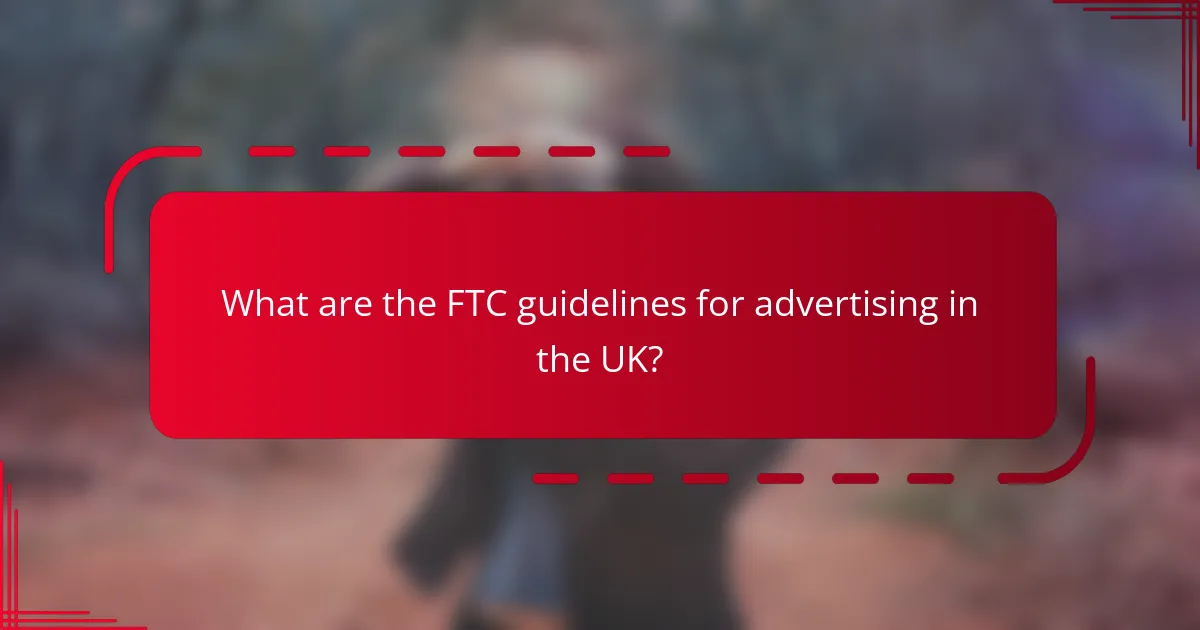The FTC guidelines for advertising stress the necessity of honesty and transparency in marketing practices, requiring advertisers to make truthful claims and disclose any material connections to consumers. To ensure compliance, businesses should implement structured processes, including regular training and audits of advertising materials. Failure to adhere to these guidelines can result in severe repercussions, such as financial penalties and damage to brand reputation.

What are the FTC guidelines for advertising in the UK?
The FTC guidelines for advertising in the UK emphasize the importance of honesty and transparency in marketing practices. Advertisers must ensure that their claims are truthful and that any material connections are clearly disclosed to consumers.
Truthfulness in advertising
Truthfulness in advertising requires that all claims made about a product or service are accurate and not misleading. Advertisers should avoid exaggerations and ensure that any statements can be substantiated with evidence. For example, if a product claims to be “the best,” it should have data or testimonials to support that assertion.
To maintain compliance, businesses should regularly review their advertising materials and ensure that all information presented is current and factual. This includes avoiding vague language that could lead to misinterpretation by consumers.
Clear disclosure of material connections
Clear disclosure of material connections involves informing consumers about any relationships that could influence their purchasing decisions. For instance, if a social media influencer is paid to promote a product, this must be explicitly stated to avoid misleading the audience.
Advertisers should use clear and conspicuous language when disclosing these connections, ensuring that the information is easily noticeable. This can include phrases like “paid partnership” or “sponsored content,” which help clarify the nature of the relationship.
Prohibition of deceptive practices
The prohibition of deceptive practices means that any advertising that is likely to mislead consumers is not allowed. This includes false claims, misleading visuals, or omitting important information that could affect a consumer’s decision.
To avoid deceptive practices, businesses should conduct thorough reviews of their advertising strategies and seek legal advice if necessary. Common pitfalls include using fine print to hide critical details or making claims without proper evidence to back them up.

How can businesses ensure compliance with FTC guidelines?
Businesses can ensure compliance with FTC guidelines by implementing structured processes that include regular training, compliance checklists, and audits of advertising materials. These steps help maintain transparency and accountability in marketing practices, reducing the risk of violations.
Regular training for marketing teams
Regular training for marketing teams is essential to keep staff informed about FTC guidelines and changes in regulations. Training sessions should cover topics such as truth in advertising, endorsements, and privacy laws. Consider conducting these sessions quarterly to reinforce knowledge and address any new developments.
Incorporating real-life case studies can enhance understanding, allowing teams to see the implications of non-compliance. Additionally, providing resources like quick reference guides can help staff recall important points during their daily activities.
Implementing compliance checklists
Implementing compliance checklists can streamline the process of ensuring that all marketing materials meet FTC standards. A checklist should include key elements such as clear disclosures, accurate claims, and proper use of endorsements. This tool can serve as a practical guide during the creation and review of advertisements.
Regularly updating the checklist to reflect any changes in FTC regulations is crucial. Encourage team members to use the checklist as a standard practice before launching any marketing campaign to minimize the risk of oversight.
Conducting audits of advertising materials
Conducting audits of advertising materials helps identify potential compliance issues before they escalate. Regular audits should review various marketing channels, including social media, email campaigns, and print advertisements. This proactive approach can uncover discrepancies and ensure adherence to FTC guidelines.
Establish a schedule for audits, such as biannual reviews, and involve cross-functional teams to gain diverse perspectives. Document findings and create action plans to address any identified issues, ensuring continuous improvement in compliance efforts.

What are the consequences of non-compliance with FTC guidelines?
Non-compliance with FTC guidelines can lead to significant repercussions for businesses, including financial penalties, legal actions from consumers, and lasting damage to brand reputation. Understanding these consequences is crucial for maintaining compliance and protecting your business interests.
Fines and penalties
Businesses that fail to adhere to FTC guidelines may face substantial fines and penalties. These can range from thousands to millions of dollars, depending on the severity of the violation and the size of the company. For example, repeat offenders or those who cause significant consumer harm may incur higher penalties.
In addition to direct fines, companies may also be required to pay restitution to affected consumers. This can further increase the financial burden of non-compliance, making it essential for businesses to prioritize adherence to FTC regulations.
Legal action from consumers
Non-compliance can also result in legal action from consumers who feel misled or harmed by a company’s practices. Consumers have the right to sue for damages, which can lead to costly litigation and settlements. This not only drains financial resources but can also divert attention from core business operations.
To mitigate this risk, companies should implement robust compliance programs and ensure transparency in their marketing and advertising practices. Clear communication with consumers can help build trust and reduce the likelihood of legal disputes.
Damage to brand reputation
Failure to comply with FTC guidelines can severely damage a brand’s reputation. Negative publicity from fines or legal actions can lead to a loss of consumer trust and loyalty. Once a brand’s reputation is tarnished, it can take significant time and effort to rebuild it.
To protect brand reputation, businesses should proactively engage in ethical marketing practices and maintain compliance with FTC regulations. Regular audits and employee training can help ensure that everyone within the organization understands and adheres to these important guidelines.

What are the key requirements for digital advertising?
The key requirements for digital advertising focus on transparency, accuracy, and compliance with regulations. Advertisers must ensure that their content is clearly labeled, products are accurately represented, and data privacy regulations are adhered to in order to maintain consumer trust and avoid legal issues.
Clear labeling of sponsored content
Clear labeling of sponsored content is essential for maintaining transparency in digital advertising. Advertisers should use terms like “Sponsored,” “Ad,” or “Paid Promotion” prominently to distinguish paid content from organic posts. This helps consumers make informed decisions and reduces the risk of misleading them.
To effectively label sponsored content, consider placing the label at the top of the advertisement or within the first few lines of text. This ensures visibility and clarity, allowing users to quickly identify the nature of the content.
Accurate representation of products
Accurate representation of products is crucial to build consumer trust and comply with advertising standards. Advertisers must provide truthful information about their products, including features, pricing, and availability. Misleading claims can lead to consumer dissatisfaction and potential legal consequences.
When creating advertisements, use high-quality images and clear descriptions that reflect the actual product. Avoid exaggerations and ensure that any claims made can be substantiated. This practice not only aligns with ethical advertising but also enhances customer satisfaction.
Compliance with data privacy regulations
Compliance with data privacy regulations is a fundamental requirement for digital advertising, especially in regions with strict laws such as the EU’s General Data Protection Regulation (GDPR) and California Consumer Privacy Act (CCPA). Advertisers must obtain consent before collecting personal data and provide clear information on how that data will be used.
To ensure compliance, implement transparent privacy policies and allow users to opt-out of data collection easily. Regularly review and update your practices to align with evolving regulations, as non-compliance can result in significant fines and damage to your brand’s reputation.

How do FTC guidelines affect influencer marketing?
FTC guidelines significantly shape influencer marketing by mandating transparency in paid promotions. Influencers and brands must clearly disclose any financial relationships to maintain consumer trust and comply with legal standards.
Disclosure of paid partnerships
Under FTC guidelines, influencers must disclose paid partnerships in a clear and conspicuous manner. This means using terms like “paid partnership,” “ad,” or “sponsored” at the beginning of posts or videos to ensure viewers understand the nature of the content.
Failure to disclose paid partnerships can lead to penalties, including fines or legal action. Influencers should regularly review their posts to ensure compliance and avoid common pitfalls, such as vague language or hidden disclosures.
Guidelines for social media endorsements
The FTC requires that endorsements on social media be truthful and not misleading. Influencers must only promote products they genuinely use or believe in, and they should avoid exaggerating claims about the product’s effectiveness.
When creating endorsements, influencers should consider their audience and the platform’s specific guidelines. For example, Instagram allows for various formats, such as Stories and Reels, but each format still requires clear disclosures to comply with FTC standards.
Impact on brand-influencer relationships
FTC guidelines influence the dynamics of brand-influencer relationships by emphasizing transparency and authenticity. Brands must ensure that influencers they partner with understand and adhere to these regulations to protect their reputation.
This compliance fosters trust between brands, influencers, and consumers. Brands should provide clear guidelines and training on disclosure practices to their influencers, ensuring that both parties are aligned in their marketing efforts.

What resources are available for understanding FTC guidelines?
Numerous resources exist to help individuals and businesses comprehend FTC guidelines. These include official FTC publications, online courses, and industry-specific webinars that provide insights into compliance and best practices.
Official FTC Website
The official FTC website is a primary resource for accessing guidelines, enforcement actions, and educational materials. It offers comprehensive information on various topics, including advertising, privacy, and consumer protection. Regularly visiting this site ensures you stay updated on any changes in regulations.
Industry Associations
Many industry associations provide tailored resources that interpret FTC guidelines for specific sectors. These organizations often host workshops, create compliance toolkits, and offer legal advice to help members navigate complex regulations. Engaging with these associations can enhance understanding and compliance efforts.
Webinars and Online Courses
Webinars and online courses are valuable for gaining practical insights into FTC guidelines. These programs often feature experts who explain compliance requirements and share case studies. Participating in these educational opportunities can deepen your knowledge and provide actionable strategies for adhering to regulations.
Legal Counsel
Consulting with legal counsel experienced in FTC matters is crucial for businesses seeking compliance. Lawyers can provide personalized advice based on your specific situation and help interpret guidelines in the context of your operations. This ensures that your practices align with legal standards and reduces the risk of violations.
